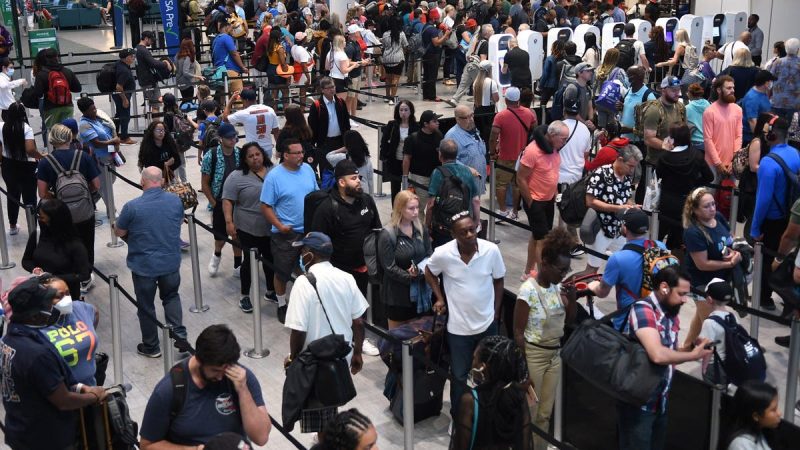The Transportation Security Administration (TSA) has been the cornerstone of U.S. aviation security since its establishment in the wake of 9/11. During that time, it has been subject to much criticism – at times fair, at times not. Despite its imperfections, the men and women of TSA have achieved their mandate of securing the U.S. transportation sector for more than 20 years.
After two decades, it’s worth asking: Is TSA working as well and efficiently as it could? And if not, how should the agency operate today?
Like many bureaucracies under anemic congressional oversight, TSA relies heavily on inefficient staffing and operational models. As the Trump administration ushers in a long-awaited championing of zero-based budgeting, privatizing most of the TSA’s labor pool – while retaining and empowering its intelligence, oversight and standards-creation roles – offers a path to taxpayer savings, better passenger experiences and continued security.
TSA – at its core – is a national security organization, and its employees serve critical national security functions. On that basis, the Trump administration recently announced it terminated the collective bargaining agreement with the union representing TSA’s frontline workers.
Privatizing screening officers should be based on a clearly communicated, step-by-step process that respects the service and important national security roles filled by these employees. Not only is this the right thing to do, but it will help ensure no security lapses occur – particularly critical during a decade that will see the U.S. host the Olympics and World Cup and several other major international sporting events guaranteed to strain the U.S. aviation ecosystem.
The Trump administration and Congress could undertake three major efforts to reform TSA without sacrificing security:
Begin the process of privatization
Expand existing programs and congressionally sponsored authorities for privatized screening. The long-standing Screening Partnership Program (SPP) allows airports to use qualified private companies, under a cost-savings model that still requires on-the-ground TSA oversight, for security screening.
Today approximately 20 airports leverage SPP, which requires vendors to follow the same processes, training and regulations as TSA-staffed screening. It also allows for performance incentives when TSA Acceptable Quality Levels are exceeded, encouraging vendors to invest in their workforce and new operational technologies to outperform – and ultimately enhance public safety.
Based on analysis of seven recent contract awards compared to government cost estimates for the same locations, SPP saves the U.S. taxpayer approximately 15% in screening costs at each airport; the House Committee on Transportation and Infrastructure also found it leads to shorter wait times. With a TSA FY 2025 screening workforce budget of almost $6.5 billion, that greater efficiency applied nationwide could save the American taxpayer nearly $1 billion a year.
Another program to formalize and expand is the Reimbursable Screening Services Program (RSSP), which ‘…(E)nables TSA to be reimbursed for establishing and providing screening services outside an airport terminal’s existing primary screening area for passengers.’ RSSP creates efficiencies for regional connections and air connectivity in parts of the country without immediate access to major international aviation hubs.
Incentivize airports through a multi-year plan
The administration should develop, and Congress should back, a multi-year privatization plan for all U.S. aviation screening services that clearly communicates timelines and milestones for rapid implementation.
Ultimately, such a plan will directly incentivize each airport nationwide to provide faster, more effective screening services to their customers under the oversight and standards enforcement of a restructured TSA as they compete for passenger market share.
This plan should direct TSA to immediately open the SPP’s Indefinite Delivery, Indefinite Quantity contract to allow more companies to be vetted and qualify as screening vendors and facilitate a jobs portal for Transportation Security Officers interested in transitioning to the private sector. It should also include a review of how the September 11th Passenger Security Fee is utilized.
A structured, transparent process will ensure no lapses in security, demonstrate deserved respect for our long-serving TSA employees, create an appropriate offramp for younger employees, and place security screening costs on airport balance sheets, realigning client-customer incentive structures.
By transferring the operational aspects of airport security screening to private entities, a restructured TSA will be able to better focus on its governmental functions of intelligence, setting and overseeing stringent security standards, and testing and evaluating new security technologies with the potential to change the face of commercial aviation. This separation of duties – common in most European airports – would focus TSA’s specialization and ensure oversight of private screeners remains robust.
Lean into technology
Investment should be accelerated into new, privacy-respecting automation technologies. Developments in privacy-by-design biometrics, AI-enabled threat detection and seamless baggage handling solutions mean immense opportunities for increased aviation-screening efficiency – particularly at the passenger checkpoint.
TSA could reallocate savings from privatization, or a greater element of the September 11th Passenger Fee, to aggressively testing these and similar technologies. The agency should prioritize validating these technologies, not managing inefficient government procurement processes that take years to bring new tech to market.
Private companies, freed from bureaucratic red tape, competing for airport contracts based on speed, efficiency, and professionalism, and incentivized by bottom-line mandates from shareholders, can adopt and implement these technologies at speed under TSA’s oversight. They should be mandated to do so once TSA-vetted technology is determined ready for deployment.
Privatizing the TSA advances the TSA’s ultimate mission – securing our transportation networks – and leads to a more seamless travel experience in the United States. The private sector can bring innovation and agility to airport security, ensuring the U.S. aviation ecosystem remains safe, secure and prepared for the future.
It also happens to be a great way to save the taxpayer billions.
Tom Plofchan is a former counselor to the secretary of the U.S. Department of Homeland Security. He is a former managing partner and chief investment officer of Pangiam, a leader in vision AI for the global trade, travel, and digital identity industries.

